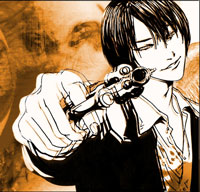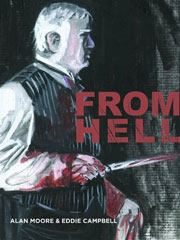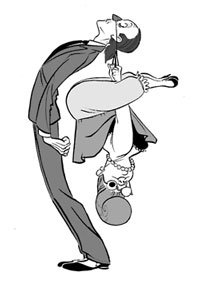By Kory Cerjak
 Title: MPD Psycho (Multiple Personality Detective Psycho)
Title: MPD Psycho (Multiple Personality Detective Psycho)
Author: Eiji Otsuka, Illustrator: Shou Tajima
Publisher: Dark Horse
Deconstructing Comics’ own Kumar Sivasubramanian translated Dark Horse’s weird and usually cerebral manga MPD Psycho into English. And it’s a good thing he did (rather, that Dark Horse licensed it in the first place) because it is the detective/crime thriller that I always look for.
MPD Psycho is about a detective named Yosuke Kobayashi who, after having his girlfriend literally mailed to him in a freezer, goes crazy and hunts down the man who did it. As a result of these events, he develops multiple personalities. The bulk of this information is given intermittently throughout volume one, which is an interesting storytelling tactic. It allows the reader to weave through the mystery him/herself while simultaneously setting up for the rest of the series with scenes like Kobayashi and future employer Machi Isono. In fact, his “transformation” to cold-blooded killer Shinji Nishizono is only revealed to us through Isono seeing a video made by a reporter.
This is why I call the manga “cerebral”. Much of what’s going on is presented to us in the first person, but it feels very much like a third person point of view. But it gets confusing because we’re looking through the eyes of Kazuhiko Amamiya (the now-dominant personality) as well as Nishizono and later Kiyoshi Murata. We’re most definitely inside of Kobayashi’s head, but we’re never immediately sure of whether it’s Kobayashi-Amamiya, Kobayashi-Nishizono, or Kobayashi-Murata. Thankfully, Otsuka clears that up quickly.
The plot itself centers around a serial killer who Isono and Amamiya’s agency is trying to track down, dubbed the “Lucy Seven” case according to Wikipedia. Those individual cases aren’t made evident to be more than just a murder. Once they solve it, it’s revealed to be part of the Lucy Seven. Lucy Seven itself is very complex, because we not only have to weave through the individual cases, but also how it ties in to the larger whole.
Despite the fact that we’re inside one of Amamiya’s many personalities at any given time, we’re still left piecing together the mystery. Amamiya isn’t aware of what Nishizono is thinking, and neither is aware of what Murata is thinking. So we, the reader, are left with bits and pieces of information that only make up a fraction of the whole.
It’s hard to write detective fiction this compelling and this interesting, and it’s a testament to Otsuka that he did it this well. It relies heavily on shocking imagery (like Kobayashi’s girlfriend being mailed to him and other dismembered bodies) early on, but it lightens up on that and becomes more than just a shock story. It’s good that it does, because Otsuka is certainly good at writing this kind of detective fiction. He can string you along and make you believe you have all the pieces of the puzzle, because Amamiya thinks he has all the pieces to the puzzle. In reality, Nishizono has a few of the missing pieces and Murata might have a few more missing pieces. We’re able to piece it all together, but it’s so interesting to watch the character work his way through it.
I don’t mean to knock on the translation of a fellow Deconstructing Comics-er, but I question one thing, and one thing only: the original Murata Kiyoshi’s speech patterns. It seems like it’d be a lot like Kugeyama from Genshiken, in that he’d have a stutter, but instead it’s just drawn out and slow. Since I don’t know what the original was, I can’t comment on whether that’s accurate, but it seems off and slows me down reading the broken up sentences. But what do I know, I don’t even speak Japanese. Also that could be an editorial decision, not of the translator.
The artwork in MPD Psycho is absolutely spectacular in places and mediocre in others. The faces of Amamiya (and I do mean faces) are spectacular. The differences in expression and hair make it easy to tell which personality is in control. However, the faces of background characters seem to be the same old face with new hair. Most of the other main characters are great, but not to the level of Amamiya. The background art is fine. It adds to the ambiance as backgrounds, but it’s never great like it could be in Kare Kano. Overall, the art does what it needs to do in a story like this, and that’s support but not lead.
I love things like Dexter, Satoshi Kon’s Perfect Blue, and Blade Runner, so it’s only natural that I’d like MPD Psycho as well. It has the interesting maybe-right-but-probably-wrong serial killer, the sort of noir or neo-noir detective feel, and a mystery that isn’t told to you outright nor is it held in front of you like a carrot (I’m looking at you, J.J. Abrams).
Best of all, in volume four, MPD Psycho basically predicted the Rebuild of Evangelion.
MPD Psycho is in print by Dark Horse and easily findable at Amazon, Right Stuf, and probably your local bookstore—though it’ll most likely be shrink-wrapped. It’s also available on Dark Horse’s digital store, which is where I’ve been reading it.
 On November 23, Tim once again visited the International Manga Festival (Kaigai Manga Festa) at Tokyo Big Sight. Comics creators from around the world (including Mulele!) were exhibiting their work to an enthusiastic mostly-Japanese crowd. Tim interviewed a number of exhibitors; hear them in this week’s episode, and see them below the jump in this post!
On November 23, Tim once again visited the International Manga Festival (Kaigai Manga Festa) at Tokyo Big Sight. Comics creators from around the world (including Mulele!) were exhibiting their work to an enthusiastic mostly-Japanese crowd. Tim interviewed a number of exhibitors; hear them in this week’s episode, and see them below the jump in this post!
 In a special bonus episode, we check out a few remaining tidbits from Tim Across America’s final state, California!
In a special bonus episode, we check out a few remaining tidbits from Tim Across America’s final state, California! Tim Across America pt 2! In Nashville, Tim visits with his brother Paul about his progress on his book about Frank Miller’s Daredevil run. What was Daredevil like before Miller got ahold of the book? What was Miller’s inspiration for making it more of a gritty crime book? How did he end up contradicting his own original take on the character?
Tim Across America pt 2! In Nashville, Tim visits with his brother Paul about his progress on his book about Frank Miller’s Daredevil run. What was Daredevil like before Miller got ahold of the book? What was Miller’s inspiration for making it more of a gritty crime book? How did he end up contradicting his own original take on the character? In the early ’90s, Alan Moore and Eddie Campbell’s From Hell, based on the true story of Jack the Ripper, was published in issues, and collected in 1999. Kumar and Dana find that, upon re-reading (or re-re-re-reading), new questions still arise. What’s the story about? Why does the killer sometimes come off as a wise prophet? Many scenes are simply puzzling and need sufficient time to unpack. And then there’s the Star Wars reference…
In the early ’90s, Alan Moore and Eddie Campbell’s From Hell, based on the true story of Jack the Ripper, was published in issues, and collected in 1999. Kumar and Dana find that, upon re-reading (or re-re-re-reading), new questions still arise. What’s the story about? Why does the killer sometimes come off as a wise prophet? Many scenes are simply puzzling and need sufficient time to unpack. And then there’s the Star Wars reference…




